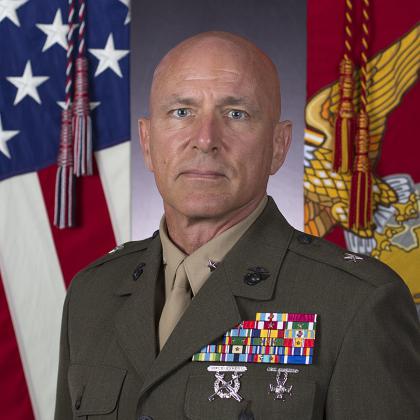The Services Are Looking for Experts and a Few Artists
Training by suppliers in the private sector is increasingly critical, as new capabilities must be acquired quickly, and military training programs are unable to keep up with evolving technologies.
“The military schooling system is getting [to be], as you know, a long and arduous process. And to change the programs or instruction takes millions of years and thousands of lives to do,” said Maj. Gen. Joseph Matos, USMC, deputy commander, Joint Force Headquarters-Cyber, U.S. Marines Cyberspace Command.
Gen. Matos spoke about how his service adopted a cloud technology vendor that brought new ideas. To incorporate them into his part of the service, Marines requested deep training and understanding directly from the supplier to avoid delays.
The panel, “View from the Service Cyber Component Commands” at AFCEA’s TechNet Cyber 2023 event in Baltimore on Tuesday brought leaders from the services to share experiences and challenges in information and cyber warfare.
As the Department of Defense has evolved toward data acquisition and storage, the challenges have become increasingly complex.
“We've learned a lot with data sharing,” said Angela Carter, deputy to commander, Joint Force Headquarters Cyber, U.S. Navy.

We are nowhere near that skill level that industry has.
“I also think it's not just about the volume of data that we're collecting. It's about how we are looking at that data and understanding that data and enhancing how we are, you know, forming our warfighting capabilities; but also, we're translating that data into options for our combatant commanders,” added Carter.
With large data volumes, using it appropriately has become the next challenge. And new technologies should be adopted.
“Anything we can do to buy down that complexity by leveraging [artificial intelligence] and [machine learning] would be absolutely fantastic and essential for, I think, the challenges that we face in the future,” said Lt. Gen. Maria Barrett, USA, commanding general, U.S. Army Cyber Command.
But to bring those new capabilities into a labor market where the private sector can attract artificial intelligence and machine learning specialists with more generous pay packages than the federal government, retaining and upgrading military and civilian talent already in service becomes critical.
Upgrading and improving the skills of airmen was an area of focus for Lt. Gen. Kevin Kennedy, U.S. Air Force’s Cyber commander. According to all panelists, this helps improve capabilities and retain the talent already acquired.
“We are nowhere near that skill level that industry has when it comes to operating [artificial intelligence],” Gen. Matos said, as panelists agreed on the need to make a critical upgrade to continue evolving along this technology avenue.
Still, there is another alternative that not only includes cooperation with the private sector but also brings a variety of options for newly qualified individuals who wish to serve.
“This auxiliary workforce is agnostic of whether you're coming from industry or in the military, so even the general sitting and the artists in front of me can serve at the Coast Guard Auxiliary,” said Capt. Adam Morrison, USCG, deputy commander, U.S. Coast Guard Cyber Command.
Morrison explained that the Coast Guard Auxiliary was an alternative for the institution to acquire diverse individuals with novel skill sets. Capt. Morrison explained that those who participate are in many cases assigned to positions of vital responsibility including port and sea lane security.
This panel was moderated by Brig. Gen. Paul Fredenburgh, USA (Ret.), executive vice president, Defense and National Security, AFCEA International.





Comments